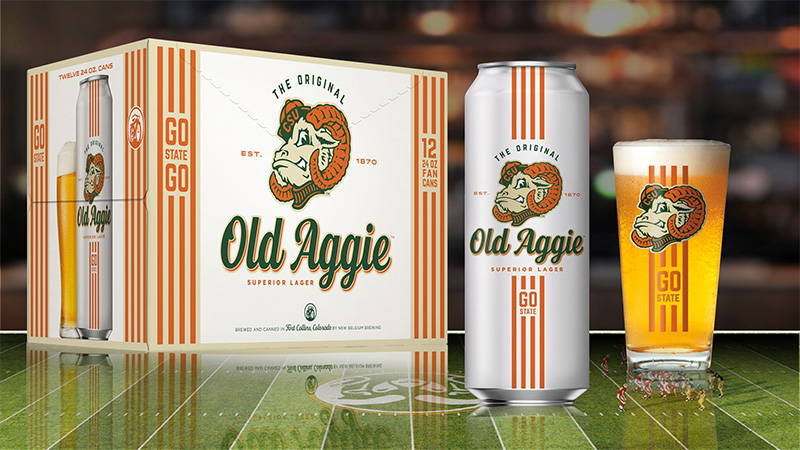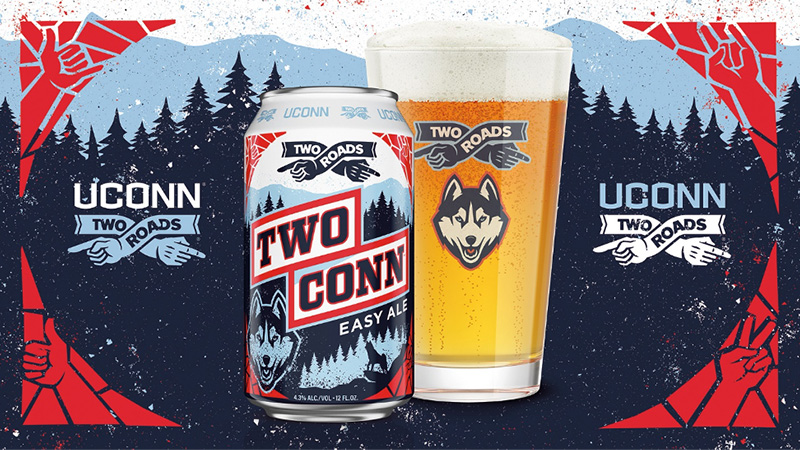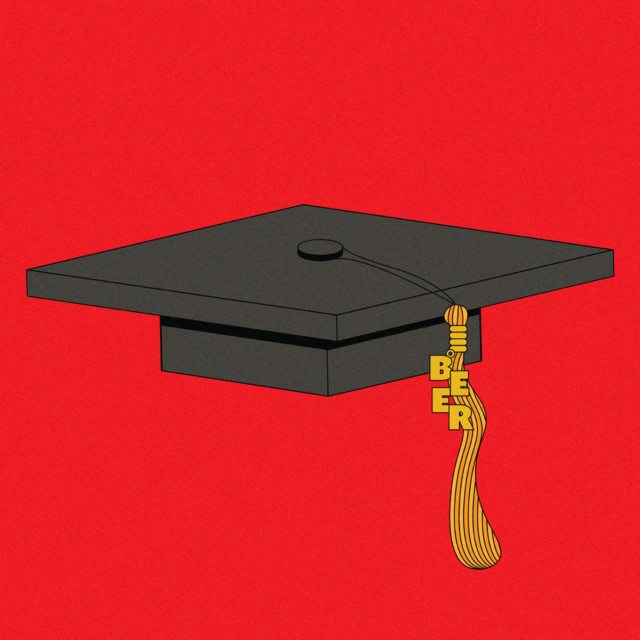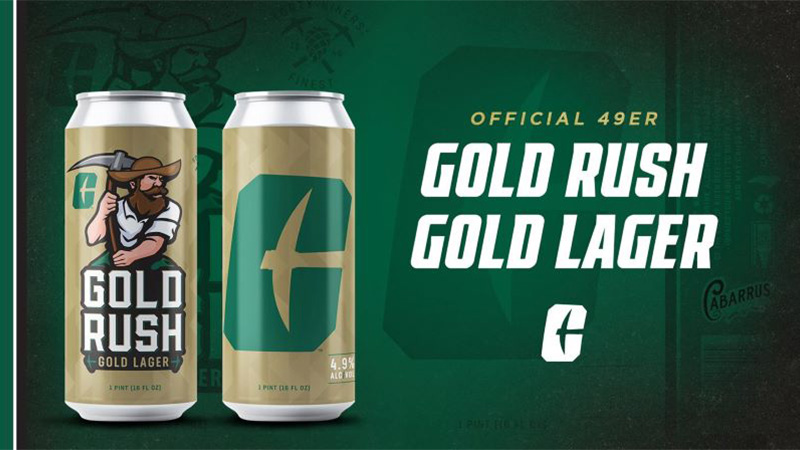Gabe Jensen was baffled by marketing a blonde ale. The CEO of Bosque Brewing in Albuquerque, N.M., liked the bright and balanced beer, but this was the IPA-soaked late 2010s. Selling anything with scant hops seemed like a losing bet. “At that time in craft beer, a blonde ale wasn’t that exciting,” Jensen says.
Then New Mexico State University came calling. The college was looking to sell branded consumables, including beer, and Bosque seemed like a good fit. The brewery ran a taproom in Las Cruces, home to NMSU, and Jensen and other owners were alumni. “We were pretty much in from the beginning,” Jensen says.
The blonde became Pistol Pete’s 1888 Ale, named after the college’s cowboy mascot and founding year. Pistol Pete’s debuted on draft in fall 2017 at Bosque’s Las Cruces taproom and Aggie Memorial Stadium, home to the college’s football team, and statewide the following year in cans featuring the school’s crimson and silver colors. The branded beer — the label features the school’s fight song — is now the brewery’s top seller off-premise in southern New Mexico, NMSU’s home territory. “It’s just really taken off,” Jensen says, adding that the brewery now also makes the officially licensed 1888 Hard Seltzer. “We’re always exploring the possibility of expanding the [1888] brand,” he says.
The last couple years have been brutal for higher education’s bottom line, tattered by budget cuts. The pandemic forced colleges to shutter dorms and empty stadiums and arenas, depriving institutions of revenue. Seeking new monetary streams and pathways to connect with local communities and of-age alumni, colleges are increasingly selling beer at sporting events and collaborating with breweries on officially licensed beers and seltzers suited for tailgating, drinking during games, and toasting long after whistles blow.
“It’s all about engagement,” says Steve Steinbacher, a founder of Cabarrus Brewing in Concord, N.C. “How do you engage your alumni and fan base beyond just going to the game?”
Creating New College Traditions
Along with foam fingers and face paint, beer is a constant at professional sporting events. Cold lagers lubricate fans rooting for home teams and booing rivals. By and large, behemoth lager brands such as Coors Light and Bud Light dominate sponsorship and concession stands in big-bucks leagues, especially the NFL and MLB.
Alcohol has historically been off limits at college stadiums and arenas where underage students are legion. It’s mixed messaging to sell fresh draft beer in front of freshmen. But to enhance the game day experience and concession sales, the NCAA, college conferences, and universities have gradually allowed alcohol sales at collegiate sporting events, opening brew kettles for custom partnerships.
Based around 25 miles northeast of Charlotte, N.C., Cabarrus has focused on sports collaborations with the local motor speedway and minor league baseball team. “We’re very focused on our backyard,” Steinbacher says.
Last August, the brewery partnered with the University of North Carolina at Charlotte on Gold Rush Lager, brewed for the college’s Charlotte 49ers teams. “It was their idea, which was a stroke of genius, to tie the alcohol at 4.9 percent,” Steinbacher says. The robust lager also unites often disparate customer bases, satisfying “both craft and domestic beer drinkers.”
If craft brewing is known for big flavor and boozy beer, sports are interlinked with chug-a-lug lagers light in flavor and alcohol. When Two Roads in Stratford, Conn., teamed up with the University of Connecticut last year, the brewery split the difference with a low-alcohol golden ale, featuring honey and caramel malts, that “appeals to the masses,” says director of marketing Collin Kennedy.
TwoConn Easy Ale debuted on draft last November and is now available in cans. The label features UConn’s red and blue colors and husky mascot, an iconic canine beloved across Connecticut. “We wanted something that could suit any drinker that was a fan of UConn athletics,” Kennedy says.
In 2020, Karbach Brewing of Houston partnered with Texas A&M University on the German-style 12th Man Lager, the cans decorated with the school’s logo and trademarked Aggie Maroon color. Cans and drafts of 12th Man Lager — named for the school’s historic game day tradition — are only sold in Bryan–College Station, the college’s metropolitan region. “It gives alumni a reason to make a pilgrimage to their old stomping grounds, go back to a game, and have a great beer,” says Karbach director of marketing David Graham.
Like a modern version of “Smokey and the Bandit,” Texas A&M fans “can stock up before they go home so they can share with their alumni friends wherever they might live,” Graham says.

An Educated Approach
Partnerships between breweries and colleges can extend beyond filling coolers. Licensed beers can also support students interested in pursuing a beer career. A portion of proceeds from sales of 12th Man are earmarked for an in-the-works Texas A&M brewing science program that will “educate the next generation of craft brewers,” Graham says.
New Belgium is a longtime supporter of Colorado State University, based in the brewery’s hometown of Fort Collins, Colo. In 2015, CEO Kim Jordan donated $1 million to help renovate CSU’s fermentation sciences lab, fostering “a continuous pipeline of professionals with a deep understanding of brewing science,” says New Belgium COO Joe Davis, adding that the brewery employs numerous alumni.
The following year, New Belgium donated $4 million to help fund construction of the college’s new stadium, where it opened the New Belgium Porch bar in 2017. “We recognized that a co-branded beer would be a critical element to bring that space alive,” Davis says.
New Belgium created Old Aggie Superior Lager, the label featuring a retro ram’s head logo that nods to the college’s sports teams, the Colorado State Rams. Six percent of gross revenue of Old Aggie sales go to CSU, the money split evenly between the athletics department, fermentation science program, and educating students on responsible consumption.
New Belgium also operates a brewery in Asheville, N.C., and in 2019 it entered a partnership with North Carolina State University, home to the Wolfpack sports teams, to make Old Tuffy Premium Lager. (Tuffy is the school mascot, and in real life a wolf-like dog.) A portion of sales supports the university’s fermentation sciences program, and the light lager now includes grains from North Carolina’s Riverbend Malt House that deepen the brewery’s “connection with the university and the state,” Davis says.

Finding Regional Footing
Ten years ago, many breweries dreamed big of regional and national distribution, but 6-packs often grew dusty on distant shelves, with second facilities either shelved or sold. In 2016, Deschutes Brewery in Bend, Ore., announced its plan to build a brewery in Roanoke, Va., opening a taproom in anticipation one year later. With ongoing challenges posed by the pandemic, however, Deschutes closed its taproom at 2021’s end, and the brewery buildout is indefinitely delayed.
But perhaps sticking closer to home isn’t necessarily a negative. Deschutes largely sells beer along the West Coast, Pacific Northwest, and nearby states, a footprint that aligns with Pac-12 Conference teams. Looking to diversify sponsors and embrace craft beer, representatives reached out to Deschutes. “When I received that email, the light bulb went on,” says Neal Stewart, the vice president of sales and marketing.
Last year, the brewery signed a deal to become the Pac-12’s official beer. The goal, Stewart says, is becoming a must-have for Pac-12 beer fans by offering existing brands in a new format, such as a Pac-12 Pack. “I would love to do a variety 12-pack that becomes the accessory that you see at tailgates,” Stewart says.
With a quarter-century track record in Southern California, Stone Brewing “stood out as a somewhat obvious or ideal partner” for the University of Southern California, says vice president of marketing Erin Smith. In 2021, Stone became the official craft beer sponsor of USC Athletics, spanning football, basketball, volleyball, and beyond. (USC is part of the Pac-12; beer sponsorships are often layered across bowl games, conferences, and colleges.)
Fans will find Stone tap handles at the Los Angeles Memorial Coliseum and Galen Center, home to the college’s football and basketball teams, pouring the flagship IPA and lime-enhanced Buenaveza lager, among other beers. Stone is also looking to engage in all USC Athletics events, creating activations during tailgating, alumni get-togethers, and watch parties everywhere. For USC Athletics, “the fan base extends internationally,” Smith says, adding that “there’s incredible pride in your alma mater.”
Finding new markets to sell beer is tough sledding. Giving it the old college try can help breweries appeal to different audiences. “Collegiate fan bases are incredibly passionate and are a great opportunity to build both sustained growth and loyalty,” says Dave Knospe, a senior brand manager for New Belgium. “Old Aggie and Old Tuffy have become the de facto official beer of each alumni group.”
Kennedy of Two Roads sees TwoConn as an entryway into the brewery’s broader portfolio. “It became a way to get into those accounts and talk to accounts,” Kennedy says. “Here’s TwoConn, but your consumers may like these other brands.”
Cabarrus found such success with its football-themed Gold Rush Lager that it’s now brewed year-round, and the brewery created Pick and Roll Pale Ale for basketball season. Plans are also afoot for a spring beer, giving Cabarrus a sporting chance for success. “Beer is emotional just like sports are emotional,” Steinbacher says. “If you can associate your brand with a positive emotional experience or memory, it’s more likely people will choose that product.”
This story is a part of VP Pro, our free platform and newsletter for drinks industry professionals, covering wine, beer, liquor, and beyond. Sign up for VP Pro now!

